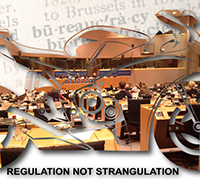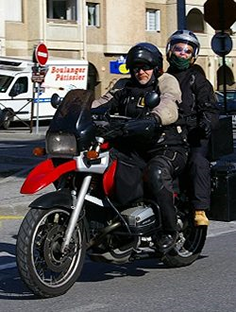 Voting took place yesterday at the Committee of the Internal Market and Consumer Protection (IMCO) meeting in the European Parliament.
Voting took place yesterday at the Committee of the Internal Market and Consumer Protection (IMCO) meeting in the European Parliament.
The vote covered over three hundred amendments submitted by MEPs to EU Regulation proposal for motorcycles, (aka the approval and market surveillance of two-or three-wheel vehicles and quadricycles) and a draft report submitted by Dutch MEP and Rapporteur Wim van de camp.
Watching the webstream of the meeting via EuroparlTV, it was hard to keep up with the voting so rather than make a mistake we will be waiting for the published report, which is due in the next few days, before giving our comments.
Mr van de Camp and the chair of the IMCO UK MEP Malcolm harbour commented during the meeting that emissions would be reduced and the safety of motorcycles improved.
Although there were still technical issues regarding brakes with talks on going and modifications and anti-tampering to be considered after the vote and before the regulation goes before an European Parliament plenary session for voting.
Technical
While the dust has settled over the vote to the amendments to the regulation proposal, there is a long way to go to yet.
The Council of Ministers may not agree with the report from the IMCO that changes the European Commission proposal and the European Commission may not agree with the amendments to their proposal.
As reported previously the Commission’s Motorcycle Working Group (MCWG) will be meeting on December 14th to discuss the status of the proposed regulation it will be looking at studies regarding – durability – powertrain tampering prevention and the introduction of new planned studies.
We are led to believe that the preliminary study results from TRL regarding powertrain tampering will be published for this meeting.
This working group made up of stakeholders, including FEMA, FIM and Member States Government representatives will be looking at the drafting of the delegated and implementing acts of the regulation.
It is the contents of these acts or rather, the lack of information that is causing angst amongst riders.
We have contacted FEMA (Federation of European Motorcyclists Federation) and they issued an updated position and views following the vote and in preparation of the lobbying needs at the Council yesterday 5th November. FEMA states:
“In the view of IMCO, as from 2016 motorcycles will have to become cleaner and manufacturers must apply ABS, even for light motorcycles. And as from 2014, measures to prevent powertrain modifications (which are still to be developed) must be applied and users shall present their bikes for inspection when carrying out “substantial” modifications.
With regard to powertrain modifications [Article 18] IMCO adopted a compromise in line with the European Commission’s logic, with delegated acts laying down measures for manufacturers to prevent subsequent modifications by the user that may have adverse effects on safety or the environment.
Additionally IMCO added a new article 18a which requires that users seek inspection and approval “by the competent authorities” in case of substantial powertrain modifications. “A modification is deemed to be substantial when it renders the original type approval obsolete” or when it harms safety or the environment.”
According to the FEMA General Secretary “This regulation contains many good parts FEMA is in line with, like durability requirements and improved access to repair and maintenance information for the user. But if the current text of article 18 is finally adopted, it will mean that all the usual changes motorcyclists make for riding comfort, fuel efficiency, or simply to suit their riding style, will be illegal or will have to be checked and approved, even this has not been a problem so far and there is no reason why it should become a problem tomorrow. FEMA will certainly keep on working on this regulation.”
Political
As reported previously, we have contacted each of the seven political groups in the European Parliament asking them for their opinion regarding the proposal, especially surrounding the issue of anti-tampering and how this would or not affect motorcyclists from the custom of modifying their motorcycles.
On top of this we have also contacted the Rapporteur and Shadow rapporteurs in the IMCO committee, we asked them their views on the proposal and the amendments especially any that they may have submitted.
We asked them:
- How did you arrive at this conclusion?
- What are your reasoning and justification to take this approach?
- Did you take the opinion or views of motorcyclists in consideration before submitting the amendment/s?
- Was this entirely your opinion or view or those of your party or political group, or other lobbying by industry or other interested parties?
- What do you think the implications of the regulation will have on the ability of motorcyclists to legally modify or customise their motorcycles/trikes?
- What do you think the implications of the amendments submitted regarding Article 18, will have on the ability of motorcyclists to legally modify or customise their motorcycles/trikes, including disabled riders to adapt their motorcycles/trikes to their disability?
With regards to mopeds, although the Commission has been unable to provide evidence that tampering of mopeds is wide spread, the Commission wishes to extend anti-tampering measures to L1 and L2 category vehicles. However, given that both the Commission and yourselves have agreed to exclude the 74 Kw limit from the proposal and subsequent regulation, you evidently accept that speed is not an issue in relation to the power of the motorcycle. It is a fact that the low speed of mopeds (45 kph) can lead to dangerous situations in heavy traffic in cities such as Rome, Madrid, Paris etc.
- Would you support an increase in the threshold of speed for mopeds to 55 kph in order that the moped rider can safely manoeuvre in traffic? (That would not only eliminate the danger for these riders, but would also ensure that they have no reason to tamper with the power outlet i.e. modify the power train).
We are aware of the Impact Assessment that is being carried out, however regarding ABS (Advanced Braking Systems) and amendments to the fitting of these systems (Antilock Braking Systems (ABS) – Combined Braking Systems (CBS)).
- Do you not think that rather than technically regulating the type of system to be fitted, that this should be left to the motorcycle industry and innovation and technical advances to decide which systems suit the overall technical specification e.g. scooters and smaller motorcycles?
So although the dust has settled for now an understanding of the next steps is required to move forward in the decision process, as riders you may not like the EU but it is what we have, for now, as FEMA communicated to us, they are focusing their action on following the decision process as close as possible.
This may not be the direct action of more protests and demo rides that riders are already suggesting should take place but it is the necessary work that needs to be processed, understood and explained in detail so that there is no misperception in the details and complexity.
We have seen in the UK and Ireland how passionate riders are regarding this proposal and many of us have raised our concerns about the outcome of the proposed regulation.
Read the full article on Right To Ride EU: Click Here


